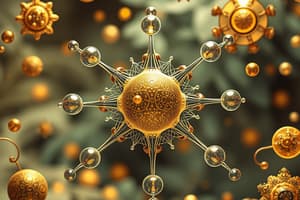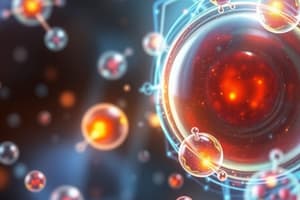Podcast
Questions and Answers
What is the main focus of chemistry as a discipline within science?
What is the main focus of chemistry as a discipline within science?
- Studying the behavior of living organisms
- Exploring the effects of climate change
- Analyzing historical events through chemical reactions
- Investigating matter and its interactions with energy and other forms of matter (correct)
Why is understanding atomic structures important in chemistry?
Why is understanding atomic structures important in chemistry?
- To explore the impact of social media on modern science
- To predict the weather patterns accurately
- To enable chemists to predict and explain chemical reactions (correct)
- To explain the different states of matter like solids, liquids, and gases
What does the Periodic Table organize elements by?
What does the Periodic Table organize elements by?
- Their atomic number (correct)
- Their geographical location on Earth
- Their alphabetical order
- Their color in the visible spectrum
In the formation of sodium chloride (NaCl), why does sodium readily lose electrons when combined with chlorine?
In the formation of sodium chloride (NaCl), why does sodium readily lose electrons when combined with chlorine?
How do atoms combine to form molecules?
How do atoms combine to form molecules?
Which of the following best describes a physical property of a substance?
Which of the following best describes a physical property of a substance?
What distinguishes chemical reactions from physical properties?
What distinguishes chemical reactions from physical properties?
Which of the following best represents an example of a chemical reaction?
Which of the following best represents an example of a chemical reaction?
How does studying chemistry help scientists better understand the material world?
How does studying chemistry help scientists better understand the material world?
Which of the following is NOT an example of a physical property?
Which of the following is NOT an example of a physical property?
Study Notes
Science is a broad field of study encompassing various disciplines that seek to understand the natural world through observation, experimentation, and theoretical explanation. Chemistry, one such discipline within science, specifically focuses on studying matter and its interactions with energy and other forms of matter. In this context, we will explore some key concepts in chemistry that demonstrate the depth and breadth of this fascinating subject.
Atoms and Molecules
At the heart of every chemical compound—from water to salt to diamonds—are atoms. These tiny building blocks combine together to form molecules, which can range from simple like hydrogen gas (H₂) to complex like table sugar (C₁₂H₂₂O₁₁). Understanding how these atomic structures interact helps chemists predict and explain chemical reactions.
Elements and Compounds
The Periodic Table organizes all known elements by their atomic number, which represents the number of protons each element has in its nucleus. This classification is crucial because it allows us to understand how different elements bond to create compounds. For instance, sodium (Na), which only needs one electron to fill its outer shell, readily loses electrons when combined with chlorine (Cl), creating sodium chloride (NaCl) and freeing up two more electrons for Cl atoms to become stable.
Physical Properties vs. Chemical Reactions
Physical properties describe the observable characteristics of a substance without changing its composition. Examples include melting point, boiling point, hardness, solubility, etc.. On the other hand, chemical reactions involve changes in a substance's composition; they can result in new materials, heat release or absorption, light emission, sound production, etc. An example of a physical change is ice turning into liquid water, while burning wood results in a chemical reaction where carbon dioxide and water vapor are released.
Chemistry draws upon many scientific fields to help us better understand the material world around us. It provides explanations for why leaves turn color in autumn, how lightning works, and even influences our daily lives through products like detergents and pharmaceuticals. By studying chemistry, scientists learn about conservation laws, thermodynamics, spectroscopy, kinetics, catalysis, environmental issues, and more.
Studying That Suits You
Use AI to generate personalized quizzes and flashcards to suit your learning preferences.
Description
Delve into the fundamental principles of chemistry, such as atoms and molecules, elements and compounds, and physical properties versus chemical reactions. Learn how these concepts shape our understanding of the natural world and everyday phenomena.




